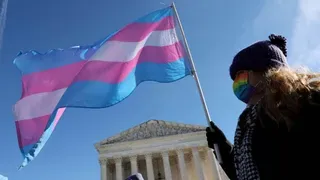April 27, 2010
Parents in Maryland County Protest Students' Access to Gay Websites
Kilian Melloy READ TIME: 4 MIN.
Some parents and at least one politician in Maryland say that a school district's having complied with state law in unblocking school computer access to GLBT equality advocates' web sites should have been a matter for parents--not the school board--to determine, reported ABC affiliate WMAR Channel 2 on April 27.
The article made reference to the "gay and lesbian lifestyle," saying that school computers in Harford County could now be used to access sites like that run by the Human Rights Campaign, the country's largest GLBT equality lobbying organization. Students can now access information about the political and legal situation faced by GLBT Americans and their families, as well as find material designed to speak to the concerns of GLBT youth. Pornographic sites remain blocked.
However, some expressed distress at the news that the school system had brought its computer policy in line with Maryland state law, including one politician, Delegate Rick Impallaria, a Republican who proclaimed himself "shocked that something like this would happen; a decision would be made without any meetings or public notice about it; without any parental input on the situation." Added Impallaria, "In a time when so many predators are out there, I think it's wrong for a school system to advise children if they have questions about their sexuality that they should visit web sites." Parts of Harford County fall within Impallaria's district, the article noted.
An April 5 posting at Strange Bedfellows.com reported that Impallaria was pursuing the issue, and had sent a letter to protest the decision. The article quoted Impallaria as saying, ""Let me make my position very clear--I do not in any way approve unblocking these Web sites for any reason." Added the delegate, "Our schools should be putting their emphasis on teaching our children the three R's and preparing them to earn a living, which is the basis for a successful life. All these other issues should be dealt with by the parents, on their own time and on their own dime."
A follow-up article posted on April 23 reported that Impallaria urged his constituents to attend the April 26 meeting, telling them in an email that, "I examined one of these sites, and in my opinion it is 'homo promo'."
"Categorically blocking LGBT web sites was in violation of those specific regulations or statutes," explained a lawyer for the school board, Patrick Spicer, who pointed out int he WMAR Channel 2 article that similar access had been made available at schools elsewhere in the state.
But some felt that the question of following state law should have been put up to a vote, and a petition to that effect has garnered close to 700 signatures, the article said. Said Barbara Connolly, "This should be the parents' decision and not the board of education." Connolly aired her views during an April 26 meeting on the subject.
Also at the meeting was Rev. Lisa Ward, who noted, "It's hard to live in diversity but that's what our nation embraces; it takes fortitude of freedom and respect for all."
The Harford Country school district came the conclusion in March that it needed to fall in line with state law and enabled access to sites such as the one run by the Gay Lesbian Straight Education Network (GLSEN), a safe schools advocacy group that monitors the climate for GLBT students in the nation's public schools and provides educational materials to counter bullying and harassment. The decision came about after the American Civil Liberties Union (ACLU) became involved in efforts to get computer access to GLBT sites enabled. A lawyer with a firm that had coordinated with the ACLU noted that the filter used by the school system "only allowed students access to information on one side of the public debate on LGBT issues," permitting students to view sites that condemned gays or advocated against rights for gay and lesbian families, but not permitting access to GLBT sites--or to religious sites that were GLBT-affirming. At that time, district superintendent Robert Tomback received a letter from parents and students thanking him, reported dcagenda.com in a March 25 article.
"This is a positive step toward inclusiveness in HCPS policy," the letter, dated March 19 and addressed to Tomback and the board of education's Mark Wolkow. "We have brought together a group of concerned HCPS students, parents, teachers and alumnae to continue to brainstorm how we can work with you and to make our school system a safer and more supportive place for our LGBT and allied community members," the letter continued.
GLSEN reports that, according to a 2007 survey, more than 86% of LGBT students suffered bullying, harassment, and even physical abuse at school from their peers and, sometimes, their instructors.
In 2009, the ACLU challenged school districts in Tennessee on a similar block that did not allow school computers access to GLBT sites. On April 15, 2009, the ACLU said that up to 80% of Tennessee schools did not allow students access to non-sexual, non-pornographic sites where educational information and news could be accessed about GLBT matters.
Kilian Melloy serves as EDGE Media Network's Associate Arts Editor and Staff Contributor. His professional memberships include the National Lesbian & Gay Journalists Association, the Boston Online Film Critics Association, The Gay and Lesbian Entertainment Critics Association, and the Boston Theater Critics Association's Elliot Norton Awards Committee.







